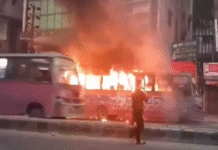Earlier, on 10 December, the Human Rights Day, the US imposed sanctions on Bangladesh’s Rapid Action Battalion (RAB) and its current and former seven officials on charges of violating human rights.
Before that, in August, a discussion of the Tom Lantos Human Rights Commission expressed concerns on the situation of forced disappearances in Bangladesh.
On 7 June, while speaking in a session presided over by House of Representatives speaker Nancy Pelosi, Jamie Raskin said, “I rise today in solidarity with the people of Bangladesh. I want to voice my support for human rights defenders, members of minority groups, and civil society in Bangladesh at this moment when the Bangladeshi government is persisting in threatening the basic human rights and civil liberties of its people.”
On International Human Rights Day last year, the US Department of the Treasury announced sanctions on the Rapid Action Battalion, citing how their actions undermine the rule of law and respect for human rights and fundamental freedoms.
The United Nations reported that since the sanctions against the RAB officials were announced in December, the Bangladesh government has responded by launching a retaliatory campaign of intimidation and harassment.
The homes of at least 10 relatives of people forcibly disappeared are reported to have been raided at night, and some relatives were forced to sign statements saying that their loved ones had not in fact been forcibly disappeared.
He also said Covid-19 policies against public gatherings have been used to prevent political meetings, and to quell public protests against the government. Violence against women and indigenous activists has also intensified during the pandemic.
The Bangladeshi government employs a joint task force composed of members of police, military, and border guards called the Rapid Action Battalion, and it has consistently failed to address the excesses of these and other security forces. The Rapid Action Battalion and other Bangladeshi law enforcement entities are alleged to be responsible for more than 600 disappearances since 2009 and nearly 600 extrajudicial killings since 2018. These incidents reportedly target opposition party members, journalists, and human rights activists.










